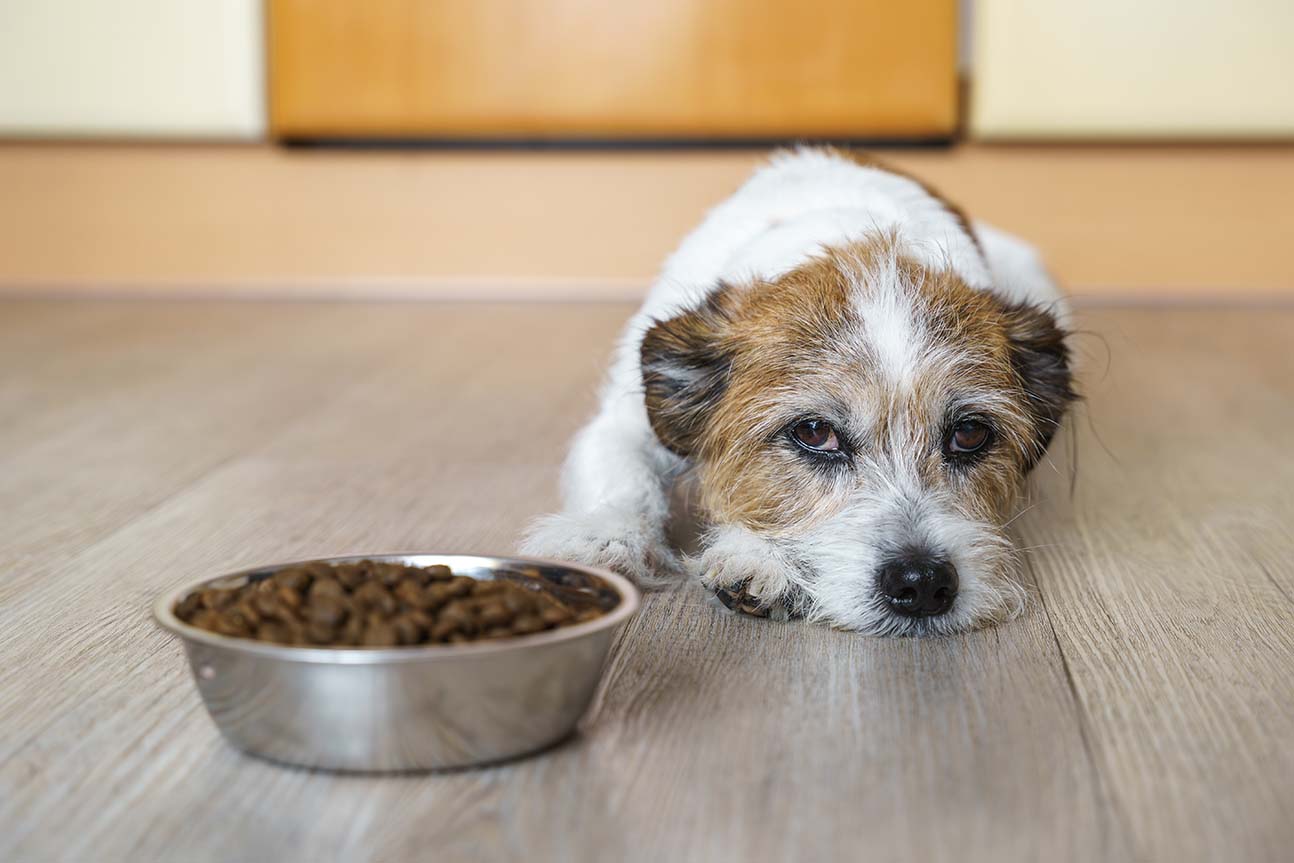Reviewed by Dr. Sarah Yosry
Updated on 15/05/2025
Reading time 4 min.
Overview
Severity: Low
Life stage: All
It is late in the evening, and the house is still—and then there it is. A curious gurgling, bubbling noise in your dog’s stomach. Certain stomach sounds are completely within normal guidelines, but others might indicate an underlying digestive disorder. As a caring pet owner, it is understandable that one can get worried and ask oneself if one’s dog needs a trip to see the doctor.
Digestive noises or borborygmi are sounds that occur when gas travels through the intestines. The gurgle in most instances is harmless and a normal part of digestion. When the gurgle is loud, persistent or different, though, it can signal an underlying health issue, particularly if one is also experiencing vomiting, diarrhea, lethargy or loss of appetite.
If you need a vet in Dubai, this is going to assist you in knowing when to wait and when to see a vet clinic in your location. Let’s discuss what causes gurgling in a dog’s stomach and what response is needed to safeguard your pet’s health.
What Causes Loud Stomach Gurgling in Dogs?
Hunger or an empty belly
One of the most frequent—and least alarming—reasons for gurgling in the belly is hunger. When your dog hasn’t eaten in a while, its belly and intestines keep churning around air and digestive juices, which make noise. You are most likely to notice it in the morning before breakfast or if your dog has missed a meal.
This gurgling is normally temporary and subsides after meals. Unless your dog is otherwise in good health and active, no cause for alarm exists. It is possible to regulate your dog’s feeding time to decrease nighttime gurgling.
Swallowing air or eating in haste
Dogs who wolf their food quickly can ingest air in addition to food and thus develop gas and gaseous noises within their stomachs. These are usually accompanied by burps and mild bloating. Though not problematic in general, it can cause discomfort. Slow-feeder bowls or more frequent, smaller portions may help prevent it.
If noise continues, or if your dog appears to be in discomfort, it may indicate that you need to seek a vet clinic for evaluation.
Gastrointestinal Distress
Sudden diet changes, eating spoiled food, or eating something that is out of place (such as trash or a non-food item) may cause digestive disturbances. These incidents may be gurgling accompanied by diarrhea or vomiting, or even manifestations of abdominal discomfort.
This is commonly called dietary indiscretion and is one of the most common reasons pet owners visit a pet clinic. When these symptoms do not pass in 24 hours or get continually worse, it’s time to call in a nearby veterinary clinic.
Bloating and Gas
Loud gurgling sounds can result from a buildup in the stomach or intestines due to gas. Excess air or food fermentation is often merely a mild issue. Gas buildup, though, can develop into gastric dilatation-volvulus or bloat in serious circumstances, especially in large or deeply-chested breeds.
Bloat is an emergency in which the stomach twists around itself. If your dog has a hard or swollen abdomen and is pacing, drools greatly, or attempts vomiting but fails to bring anything up, get immediate care from a veterinary hospital.
Food Intolerances and Allergies
Dogs are sensitive to some ingredients in dry pet food, including dairy products, beef products, or grains. These ingredients can create long-term stomach problems, including gurgling in the stomach, gas, bloating, loose stool, and postprandial discomfort.
If you see a pattern between what your dog is eating and sounds in his or her belly, talk to your vet in Dubai about performing a trial of a limited-ingredient or hypoallergenic diet. A professional diagnosis is best, since improper diet modification can do more harm than good for your dog.
Intestinal Parasites
Parasites such as roundworms, hookworms, or Giardia can wreak havoc on a dog’s digestive system. These are particularly prevalent in puppies and rescue animals, but any dog can become infected through contaminated water, dirt, or stool.
Parasites can result in loud noises in the intestines, diarrhea, vomiting, and loss of weight. A diagnostic test in a veterinary clinic in Dubai can diagnose these. Parasites can often be treated after being identified through prescribed medications for deworming.
Inflammatory Bowel Disease (IBD)
Inflammatory Bowel Disease is a long-term disease where the lining of the digestive system becomes inflamed. It is a more severe underlying medical cause for stomach noises and has accompanying symptoms such as vomiting, persistent diarrhea, weight loss, and loss of appetite.
Diagnosis involves blood tests, imaging studies, and in some cases, biopsy. IBD needs long-term care under the guidance of a reliable vet clinic in Dubai using a combination of prescription diet, medication, and periodic monitoring.
Foreign Object Ingestion
Dogs are inquisitive animals and tend to gulp items they should not—they gulp socks, bones, toys, or plastic pieces. The objects obstruct the intestines and produce loud and painful gurgling noises while trying to pass around the obstruction.
This is an emergency. Take an immediate visit to a veterinary hospital if your dog is vomiting, straining, refusing food, or displaying abdominal discomfort.
When Should You See a Vet?
It can be difficult to determine when stomach gurgling is normal and when it warrants veterinary intervention. As a rule of thumb, you should visit a vet clinic in your vicinity if
• The gurgling persists or increases in volume over time.
• Your dog is vomiting, has diarrhea, or is in distress.
• Your pet dog is not eating or is lethargic.
• The abdomen looks bloated or tight.
• You believe that your dog has consumed something toxic or harmful.
If you reside in the UAE, there are several wonderful vets nearby from which to choose. Yet for thorough diagnostics and emergency services, Modern Vet Hospital in Dubai stands out as a first-rate choice relied upon by many pet owners.
How Will a Vet Diagnose the Problem?
When you take your dog in for a visit to the veterinary clinic, the veterinarian will start by doing a comprehensive physical exam for signs of tenderness, bloating, or pain. Blood tests may be prescribed if your dog exhibits dehydration or a general illness.
Additional diagnostic procedures can involve imaging (ultrasound or X-rays) for detecting obstructions or inflammation, and also intestinal testing for parasitism or infection. A dietary trial under guidance can also be prescribed if food sensitivities are suspected.
The objective is to determine the underlying cause of gurgling in the stomach for immediate treatment to start.
What Are the Treatment Options?
The application depends strictly on diagnosis. If gurgling in your dog is caused by temporary gas or appetite, a changed feeding schedule can often do the trick. Mild GI upset or dietary indiscretion can be treated by a bland diet of rice and boiled chicken, accompanied by hydration.
For more severe conditions, including parasitic infestations, food allergy, or IBD, these medications, dewormers, antibiotics, or a special diet plan may be prescribed by your veterinary clinic. When your dog has eaten a foreign body, surgery or an endoscopy may be necessary to remove the obstruction.
Early intervention is always preferable. Putting off a vet clinic Dubai visit can make things worse and lead to complications.
What Can Be Done to Prevent Stomach Gurgling in the Future?
Prevention begins with habits. Give your dog a uniform diet of high-quality foods and don’t make any sudden changes in foods or ingredients. Ensure that trash, leftovers, or harmful items like socks or bones are out of reach from your dog.
Regular vet check-ups in a veterinary clinic in Dubai are a must. These enable early identification of diet or parasitic problems and keep your dog in top shape through continued deworming, immunization, and general health checks.
If you have ongoing digestive issues, collaborate with your veterinarian in developing a personalized nutrition and health plan that can meet your dog’s unique needs.
Conclusion:
The sound of hearing your dog’s stomach gurgle loudly can be quite alarming, but not all noises necessarily constitute a cause for alarm. Nevertheless, your best option is always caution. When accompanied by signs of distress, vomiting, or bloating, stomach gurgling can indicate serious medical issues that require immediate care.
Don’t take your pet’s health for granted. If you are in Dubai and need of a reputable vet clinic near me, seek out Modern Vet Hospital and its expert professionals. With cutting-edge diagnostic tools, seasoned vets, and friendly care, they will diagnose and fix your dog’s digestive problems in no time. Schedule an appointment with Modern Vet Hospital today and treat your dog to the comfort and care that they deserve
Share this, choose your platform!
Writen by
Dr.Sarah Yosry
DVM
A product of a rich Australian/Egyptian heritage, Dr. Sarah Yosry stands as a testament to the union of diverse cultures and a shared love for animals.



